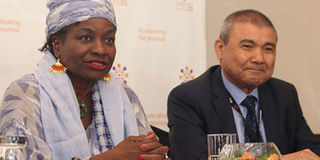See ICPD+25 as path to a better future for the family

From left: United Nations Population Fund (UNFPA) Executive Director, Dr Natalia Kanem, with the Deputy Representative Ezizgeldi Hellenov during a media briefing at a consultative meeting with innovators and partners on ICPD+25 Nairobi Summit at Villa Rosa Kempinski Hotel, Nairobi on September 19, 2019. PHOTO | KANYIRI WAHITO | NATION MEDIA GROUP
What you need to know:
- Sexual and reproductive health, rights and information are part and parcel of religious teachings. They are not scandalous.
- What is scandalous is denying consenting adult couples the means to safely and responsibly plan and strategise — and hence enter — a healthy informed parenthood.
- There is no sound religious basis for denying an expectant mother healthcare, or for denying young people information about their own bodies.
- There is no sound religious basis for marrying girls off in their childhood, or for excluding them from school.
More than 7,000 people were expected to have arrived in Kenya for a meeting that will also mark the 25th anniversary of the International Conference on Population and Development (ICPD+25), which began Tuesday in Nairobi.
ICPD is a high-level summit calling on the world to appreciate the sexual and reproductive health and rights of all people.
INFORMED PARENTHOOD
The Nairobi summit is being convened to breathe new life into an agreement reached 25 years ago, at the inaugural ICPD held in Cairo.
The Cairo consensus, embraced by all 179 governments present, was reached with the guidance and participation of many faith leaders from around the world. Yet a quarter of a century later, as delegations reaffirm their commitment to these shared goals, the role of faith leaders in reaching this consensus is at risk of being erased.
Let there be no mistake: The aims of the ICPD — to end the unmet need of child spacing, to end preventable maternal deaths, to end sexual and gender-based violence and to end forced marriages and other harmful practices against women and girls — are rooted in the sacred value and dignity of every human life.
From a biblical perspective, human dignity flows from our creation in God’s image. Sexual and reproductive health, rights and information are part and parcel of religious teachings. They are not scandalous.
What is scandalous is denying consenting adult couples the means to safely and responsibly plan and strategise — and hence enter — a healthy informed parenthood.
There is no sound religious basis for denying an expectant mother healthcare, or for denying young people information about their own bodies. There is no sound religious basis for marrying girls off in their childhood, or for excluding them from school.
RELIGIOUS VALUES
There is no sound religious basis for cutting girls’ and women’s genitals, for what God created is the best.
The Bible says, in Genesis 1:31: “God saw all that He had made, and it was very good.” From the Koran, we learn that, “Verily, We created man in the best form.” (Koran 95:4).
Our faiths abhor the abuse and degradation of women and girls. Our faiths hold that bonds of love, marriage, family and community are strengthened when we safeguard the welfare of all people, when we protect their dignity, fortify them with age-appropriate education, and nurture them with spiritual, psychological and physical healthcare.
This empowers adults to choose spouses, and couples to plan, space and time their children without overburdening themselves or the society, and thereby complete their families in accordance to their religious values.
The Koran teaches us: “Allah does not burden a soul beyond that it can bear…” It empowers young people to act as responsible stewards of their own bodies and futures. These are the values of the ICPD, and they do not contradict our beliefs; they spring from our beliefs.
HUMAN DIGNITY
Some would influence you to believe that the Nairobi summit will force communities and governments to adopt commitments with which they fundamentally disagree. But a simple glance at the summit’s website shows us that, in fact, all commitments are absolutely voluntary.
Be that as it may, it behoves the faith leaders to call out any commitments perceived to undermine God-given human dignity. Equally so, it falls on us, as individuals, to raise our voices collectively in support of the commitments that we believe in.
It is our responsibility, as communities of faith, to make our most deeply held convictions heard. While all leaders have an obligation to usher their people away from violence, depravity and privation, we, as faith leaders, see this duty as not only earthly but spiritual as well. We and our fellow ministers, sheikhs, imams, bishops, priests, monks and nuns must navigate our flocks away from ignorance, away from stigma and humiliation, and towards a greater human dignity.
SACRED PROMISE
For when a young person realises his or her full potential, when a healthy mother welcomes a precious newborn, when a family enjoys their health and rights, this is the fulfilment of a sacred promise. It is a celebration of the gift of life.
We invite members of all faiths to join us in calling on the world’s governments, once more, to walk the path towards a better future for all its citizens irrespective of age, gender, colour, race, religion or class, for we are shepherds who should guide to the best path.
We call upon religious leaders to gird the flock that God has placed in their care, especially the already endangered lives of women and girls.
Rev Dr Mwaniki, an Anglican priest, is director, Department for Gender, Women and Youth, at All Africa Conference of Churches; [email protected]. Dr Sheikh Omari is national chairman, Alwahda Muslim Teachers Association, and director, Inter-Religious Affairs, Peace League Africa; [email protected]




